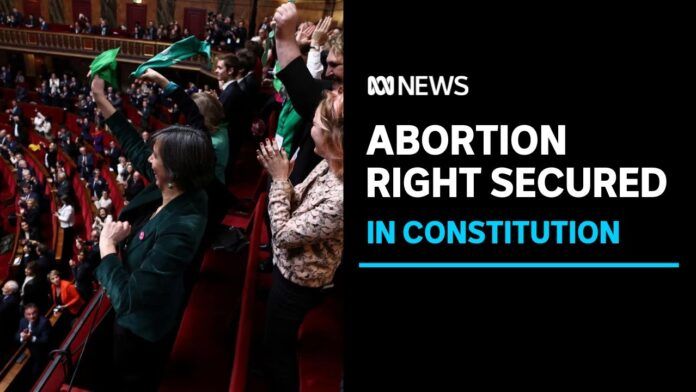In a landmark decision, France leads the global charge by enshrining abortion rights within its Constitution, setting a historical precedent.
France has officially become the first nation in the world to mark abortion rights in the constitution. This is a decision that has sparked widespread celebration and discussion across the globe. This remarkable legislative feat, achieved through a resounding 780-72 vote in favour during a special Congress session at the Palace of Versailles, not only consolidates France’s position as a frontrunner in women’s rights but also sends a potent message in the face of growing international challenges to reproductive freedoms.
Al Jazeera
Al Jazeera emphasizes the overwhelming support from French lawmakers and the jubilant scenes that unfolded across the nation as the bill was passed. The report sheds light on the proactive measures taken by France to preemptively secure women’s reproductive rights in response to the rollback of abortion rights seen in other countries, notably the United States. Prime Minister Gabriel Attal’s declaration, “We’re sending a message to all women: your body belongs to you and no one can decide for you,” encapsulates the spirit behind this historic legislation.
First Post
First Post delves into the historical context and the legislative journey leading to this momentous occasion, tracing the legal status of abortion in France since 1975. Highlighting the widespread public support for this constitutional amendment, exemplified by a 2022 poll showing 86% approval among French citizens, the article also captures the symbolic celebration with the Eiffel Tower lighting up with “My Body My Choice,” signalling a national and international celebration of women’s rights.
The Guardian
The Guardian focuses on the symbolic importance and the emotional weight of the vote, set against the historic backdrop of the Palace of Versailles. It presents personal narratives and quotes from lawmakers who championed the bill, underscoring the collective resolve to protect women’s freedoms against future political reversals. The report eloquently captures the broader implications of this legislative victory, both within France and across the globe.
BBC News
BBC News offers a comprehensive overview of the constitutional amendment, highlighting its uniqueness in explicitly guaranteeing abortion rights within a nation’s constitution. The article discusses the broad spectrum of public support for the measure and addresses the criticisms from anti-abortion factions and religious institutions, providing a balanced view of the differing perspectives surrounding this landmark change.
The New York Times
The New York Times provides an in-depth analysis of the legislative process, the historical significance of the amendment, and the broader context of abortion rights in France and worldwide. By examining the motivations behind the amendment, particularly in response to the U.S. Supreme Court’s reversal of Roe v. Wade, the report underscores the proactive and protective stance taken by France to safeguard women’s reproductive rights as fundamental human rights.
France’s constitutional protection of abortion rights marks a historic victory for women’s freedom and autonomy. This decisive action, amid an international context of contested reproductive rights, underscores the importance of safeguarding these freedoms at the highest legal level. As news outlets from Al Jazeera to The Guardian report, the global community watches closely, recognizing the potential ripple effects of France’s pioneering stance. This momentous occasion not only reaffirms the nation’s commitment to women’s rights but also challenges other countries to reflect on their legal protections for reproductive freedom. France’s bold move serves as a powerful statement: the right to choose is a fundamental freedom, now indelibly inscribed in its Constitution.
